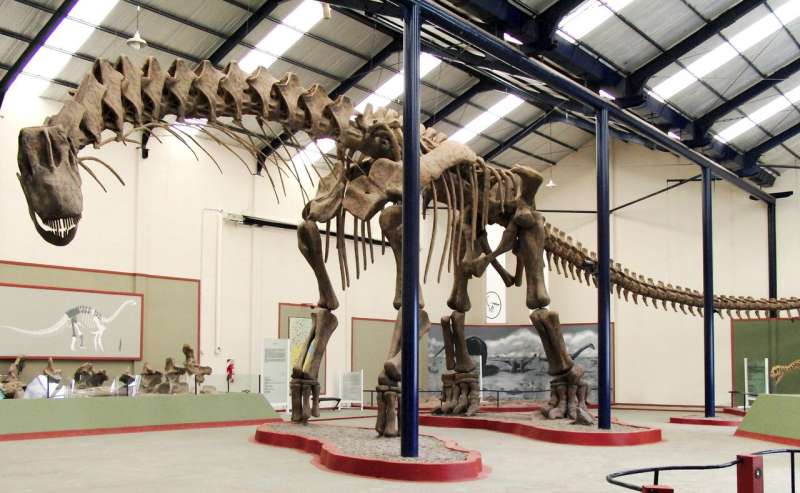Dinosaur fossils found in Argentina could belong to the largest creature ever to have walked the Earth
A team of researchers with Naturales y Museo, Universidad de Zaragoza and Universidad Nacional del Comahue has found evidence that suggests the remains of a dinosaur discovered in Argentina in 2012 may represent a creature that was the largest ever to walk the Earth.

In their paper published in the journal Cretaceous Research, the group describes the fossilized remains that have been found so far and what they have revealed.
The largest creature ever to live is believed to be the blue whale—the largest of which grow to 33.6 meters long.
The biggest land creatures are believed to have been the dinosaurs—of them, the titanosaur (as their name suggests) is believed to be the largest.
And of those, Argentinosaurus represents the largest that left enough evidence for it to be classified the heaviest—at approximately 36.5 meters in length and weighing in at a hundred tons, it would have dwarfed today’s land animals by a considerable amount.
Researchers studying Patagotitan fossils (another titanosaur found in Patagonia) have suggested some of them might have broken the record for the largest, but there was insufficient fossil evidence to prove it.
In either case, the researchers studying the new remains have begun to believe that they have found an even bigger titanosaur.
Thus far, the dinosaur has been dated back to 98 million years ago (putting it in the Late Jurassic to the early Cretaceous).
The fossils found include 24 vertebrae, all belonging to a giant tail, parts of a pelvis and a pectoral girdle.
The huge size of each suggests the dinosaur was a very large titanosaur—one that might be bigger than Argentinosaurus. That claim cannot be confirmed, however, until leg bones are found. Their size will allow the researchers to make estimates of the animals’ body weight.

Titanosaurs belong to the sauropod family, which means they were herbivores, had massive bodies and long necks and tails.
Such dinosaurs would have had few worries from meat-eating enemies if they managed to grow to full size.
Their fossils have been found on all continents except Antarctica. The researchers conclude by noting that more digging in the area will likely reveal more fossils from the same dinosaur and perhaps evidence of its true size.
